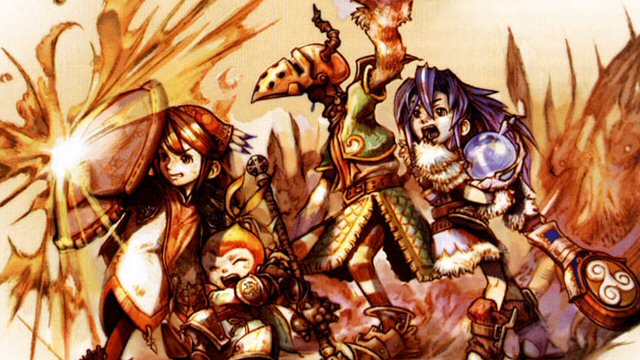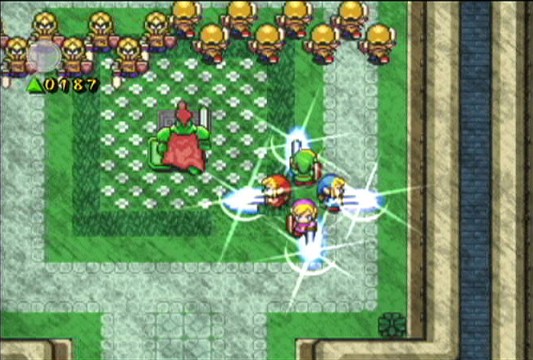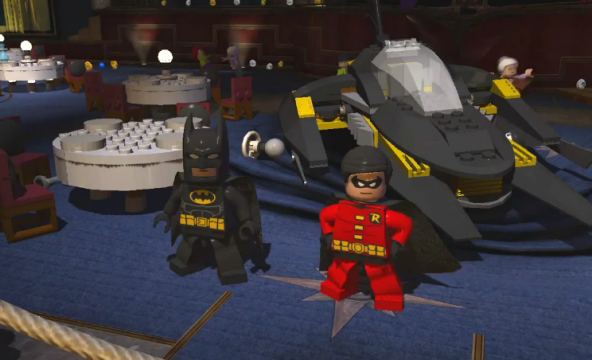
The Legend of Zelda: Four Swords Adventures also fell victim to these unfortunate pitfalls, giving players a full-priced adventure that was really only meant to be played with friends– or at least to get the most out of it what was intended for. Paying full price for something that I can only experience a specific way doesn’t sit too well with me. Moreover, being funnelled into a system and being forced to play a game within a limited framework takes away from the overall derived feeling.
Speaking of parameters, even when a single player experience is present, a game that utilizes a well-constructed co-operative mode is only as good as its foundations. The limitations and freedoms given to us in a co-operative experience are a necessary proponent of a sound multiplayer undertaking; too much of one results in an unbalanced product, even when that over-emphasised something is an allegedly positive part of the game. A delicate harmony is essential for co-op games to achieve their intended outcome, which is usually to provide the players with a distinctively exciting adventure not found outside of that specific game. Regrettably, this harmony is tricky to achieve because the variables confounding the experience aren’t ones in which the developer can always predict or accommodate.

We see this play out in certain games which provide quality co-operative play overall, but are nonetheless guilty of falling into certain gameplay pitfalls. For instance, the Lego series is a franchise that excels in the multiplayer arena. The co-op is fun, accessible, and sticks to tried-and-true sensibilities. Yet one area in which it struggles is on the user’s end. Have you ever played a title where you constantly want to push forward, but your dimwitted partner is too busy canvassing the entire screen for God only knows what reason and thus you can’t advance forward? Ever played Crystal Chronicles and had your friend pick up the chalice (which protects you from the poisonous Miasma) and be a dick by refusing to move, forcing you to halt your progress? Ever died because you’re trying to fight an enemy just barely off the screen that you can’t get to because your friend is trying to do the same thing on the opposite side of the screen? These are the human elements that create dissonance and rip the thread of the co-operative multiplayer experience, and they aren’t necessarily issues that can always be addressed or known on the side of the developers.
There’s also a problem with making sure everyone’s engaged with the game’s story. I’ve played countless titles that have intriguing tales to tell, but because my friend either isn’t interested or has already played this segment of the game, I miss significant chunks of the narrative. And don’t get me started on feeling pressure to read through a dialogue box quickly in an effort to not keep my much-faster-of-a-reader buddy waiting. That’s always awkward and anxiety-provoking, usually to the extent that I just act like I’ve read everything to not hold my partner up. In the end, I lose out on some of the experience because of this, as I’m not fully engaged in the product simply because I’m too preoccupied worrying if my partner and I are reading at the same speed. The same can go for skipping cutscenes accidentally because one person misplaces their thumb on the B button.

Perhaps one of the more frustrating issues with cooperative gaming is mistakenly identifying yourself for your partner/s. This can not only lead to a swift death on your end, but also your team mates’. When I talk about this, I remember the days of playing Double Dragon and forgetting which character I was, and fiendishly becoming infuriated when I thought I was pressing the kick button, but my erroneously identified character on-screen was doing something entirely different.
Even more aggravating is seeing the dreaded Game Over screen due to the follies of your team mate. I think we have probably all played games with someone less skilled at the game than ourselves, and experienced a hell of a time trying to wade through the obstacles with the poorly equipped person in tow– Contra pops into my head when thinking about this. There’s something absolutely maddening about losing, and it not being your fault. While it certainly generates good life lessons, sometimes I’m just simply not in the business of learning said lessons when trying to escape reality through avoidance tactics I call my video game addiction.
The point of all this is co-operative experiences, while extremely rewarding, are most of the time inherently broken. Even when a developer has brilliantly designed their game to oblige co-op gamers, they can’t eliminate human error, behavioral inconsistency, and the human condition to do things unintended or defy the rules just to demonstrate that they can. All of these elements lead to faulty experiences that seem exponentially apparent in co-op gaming specifically. If developers can learn to rework the human mind, then their modes may be able to work as desired. Until then, though, we gamers will be the primary reason why co-operative gaming can never become more than just a casually fun experience with a friend or two.
Pages: 1 2




 ShareThis
ShareThis







The last local multiplayer game I played where each member of a team played their role perfectly was Phantasy Star Online Episode 1 and 2 for Gamecube many years ago. There was no fighting one another. No one got in each other’s way. Healers healed, gunners stayed back and shot everything up with their amazing accuracy, and melee battlers got in close to deal heavy damage whenever they could.
It’s too bad that Monster Hunter doesn’t have a true offline multiplayer story mode…just arena mode, which isn’t all that great for long. Hopefully it’ll be added when they decide to make a new one for Wii U.
Ah, yes, PSO… One of my favorite Sega games, and my absolute favorite multiplyer title to date. That being said, even that experience can be broken if you mentioned healer decides they don’t want to heal, or can’t keep up the healing as quickly as you need it during that last fight with Falz. I think the point that I hoped to convey that human behavior is too inconsistent to ever make a game, where you are required to rely on another person to find success, truly competent.
That aside, did you know that PSO still has a rabid following thanks to private servers? There are still a ton of people playing, and playing all versions – Dreamcast, Gamecube, and PC. It’s remarkable how long a life that can has had. It just won’t die; and rightfully so. It’s such an important game in the MMO world.